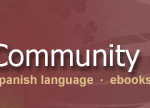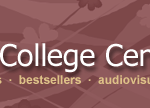|
Direct Links
online selection tools for YBP
and Baker & Taylor Customers

|
|
| Meet the Librarian |
| |

Paul O. Jenkins

Archbishop Alter Library |
Paul O. Jenkins
Director of Library Services
Archbishop Alter Library
College of Mount St. Joseph
Cincinnati, Ohio
Paul is the Director of Library Services in the Archbishop Alter Library at the College of Mount St. Joseph in Cincinnati, Ohio. Paul supervises and evaluates a staff of 4.5 full-time professional librarians, 3.5 full-time paraprofessionals, and 15 students. His job encompasses a wide variety of tasks including selecting all materials for the collection (except reference books), managing the budget, and working the Reference Desk. He can also be found conducting library instruction sessions, handling public relations efforts, practicing scholarship in library science and folk music, and serving on campus committees and task forces.
Paul received his Bachelor of Arts in German Literature from Lawrence University in 1983. He came to the Mount (as they affectionately refer to their institution) in July 1988, fresh from graduate school (MLS, University of Wisconsin-Madison) to take the position of Head of Collection Development. In October 1995, he became the Director of Library Services.
"My father was a college professor and so I spent lots of time in his institution's library as a young adult," Paul reflects. "I found the library was the place in which I felt most at home." After graduating from college he decided not to go into teaching, so he had to choose between journalism and library science. "I felt I lacked the necessary aggressiveness to become a successful journalist," Paul recalls about his decision to pursue a career in librarianship, "so here I am." He enjoys serving people, noting that it is what the profession is all about. "I guess as the youngest of three brothers I grew up serving them, and these first experiences became ingrained!"
With all of the tasks that Paul has on his plate, he feels that the best part of his job is working with the faculty to develop the library's collections. "I feel at ease with them and have their respect," he says. He was elected Head of the Faculty Assembly in 1991 and has taught a number of courses while serving at the college.
When asked about what he thinks works well in his library, Paul remarks, "we pride ourselves on providing excellent service." He notes that they try to provide some recreational materials for students and faculty via the Paperback Browsing Collection and Popular Video Collection. "All the materials in these collections were donated or purchased used, so we don't need to spend a great deal of money to satisfy such leisure activities," he states. The Library also offers numerous musical performances in the library to attract patrons.
Taking a look at which materials are most popular with the students, Paul estimates that the periodical collection is the most heavily used part of their collection. "These days that means articles found in electronic full-text, of course," he notes. Their reserves and non-print materials are used regularly, too. He believes that these trends are fairly typical of small academic libraries. "The books still get lots of use, too, but not to the extent that they once did."
Paul realizes, however, that that monographs and periodicals have very different roles depending on discipline. He uses the example that History and English disciplines have a heavier book use since more books are produced on these topics (he notes a 70/30 split). Alternatively, the Nursing field is dominated by periodicals (80/20 split). He tries to reflect this in his collection efforts.
The Library's involvement in OhioLINK has helped even out the usage statistics, however. OhioLINK is a consortium of Ohio's college and university libraries and the State Library of Ohio. Serving more than 600,000 students, faculty, and staff at 84 institutions, OhioLINK's membership includes 17 public universities, 23 community/technical colleges, 43 private colleges and the State Library of Ohio. Students from any campus have the ability to chat with a reference librarian in real-time if they have a question.
OhioLINK members currently have access to a collection of about 14,000 e-books and Paul thinks that the future of e-books can be bright. "When students are using them for the right reasons (using part of the book instead of the whole thing), it can be a very valuable tool," Paul says. They are in the process of conducting a survey of students' reactions to e-books. "In the future, when the technology is better, e-books will be great. We can overcome space and shelving problems and damage issues."
Part of Paul's collection development efforts includes the use of YBP notification slips in paper and electronic format. With over 7,000 slips sent to his library last year, it can appear an overwhelming task. "I am a quick worker," Paul says of his ability to single-handedly sort through the slips. "I know right away which books I want and I will sometimes send the slips to department faculty to review." This year, they began to receive electronic notification slips. He will begin to use the electronic slips as he feels more comfortable with them, but for now he says, "I prefer the paper because there is something very clean about being able to hold it in your hand and feel like you have it all under control."
Paul echoes the concerns of many other librarians who say that funding is one of the biggest challenges facing colleges. "In the last six or seven years we've been asked to support more programs with little or no increases to our materials budget. Plus, we purchase many databases as part of the OhioLINK consortium, and while these come with a relatively low price tag, they do add up and eat into our book budget."
On another interesting note, Paul is also facing a different kind of challenge. "Like other libraries, we continue to fight against the 'Google mentality.' That is, we strive to show why the contemporary library is still important in the Internet era. The key to winning this battle is to regularly communicate to our patrons our wide range of services. If you tell them about all your services, I think they will come!"
You can visit the College of Mount St. Joseph online at http://www.msj.edu/ and the library website at http://www.msj.edu/library/. To learn more about OhioLINK, please visit http://www.ohiolink.edu/.
Paul hopes that statewide use of YBP's approval plan can help facilitate cooperative collection development in the future. He is currently working with a group of libraries in southwestern Ohio whose goal is to avoid duplication of shared titles in non-Christian religions and instead improve title holdings found in smaller numbers in these religions.
|
|
|
|
|



